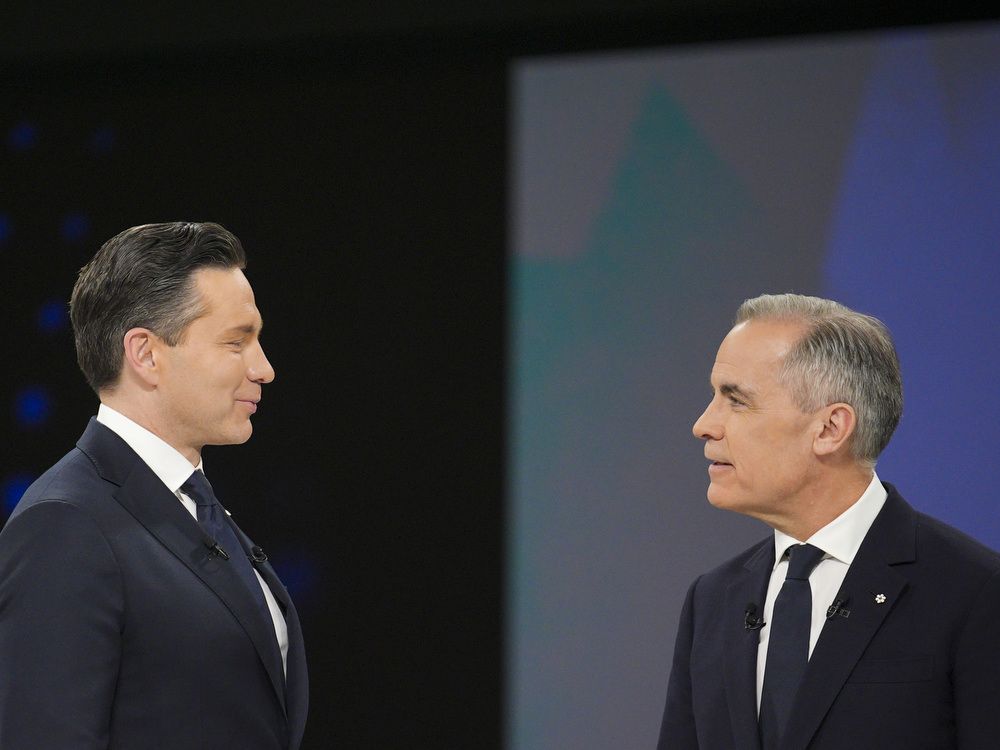September 11, 2025
Natasha Bulowski
Climate experts warn the federal government is taking another step backward on climate policy by removing the 2026 electric vehicle sales target.
Along with removing the sales target, the federal government will immediately launch a 60-day review of the EV standard to “identify future ways to reduce costs,” Prime Minister Mark Carney said at a news conference in Mississauga, Ont. on Friday.
“This will provide immediate financial relief to automakers at a time of increased pressure on their competitiveness,” Carney said, without specifics.
The delay and subsequent review of the EV sales mandate was announced as part of a suite of measures billed to “protect, build, and transform Canada’s strategic industries,” according to Carney. He referenced a forthcoming “climate competitiveness strategy” to “position Canada as a leader in decarbonization” but one expert is not optimistic.
“Climate policy planks that were delivering significant emissions reductions are falling one by one,” Debora Van Nijnatten, professor of political science and environmental studies at Wilfred Laurier University, said in a phone interview with Canada’s National Observer.
“There appears to be no plan to replace that with other emission reduction strategies, and there’s no plan in place to show how the reactive policy choices that they’ve been making in a piecemeal fashion add up to any climate strategy that is integrated with the economic strategy.”
“The Liberals keep retreating in the face of populist conservative rhetoric that targets some aspects of climate policy,” Van Nijnatten said.
As one of his first acts as Prime Minister, Carney ended the consumer carbon price — and Van Nijnatten places Carney’s pausing of the EV sales mandate on the same throughline.
“All this does is make me think … he’s going to lift the oil and gas [emissions] cap as well,” she said.
Bloc Québécois environment and climate change critic Patrick Bonin slammed Carney’s decision in an emailed statement.
“By once again bowing to pressure from the lobby of Ontario automakers and western oil companies, the federal government is weakening our environment and the availability of electric vehicles, all at the expense of Quebecers,” Bonin said in the statement, released in French.
“Once again, we see that when it comes to fighting climate change, Mark Carney has only one gear: backward.”
Conservative Leader Pierre Poilievre, who has been calling for the mandate to be scrapped, called the delay a “clumsy retreat” that adds uncertainty for investors in the auto sector. The NDP did not respond to a request for comment.
The transportation sector is responsible for 23 per cent of Canada’s emissions, second only to the oil and gas sector’s 30 per cent share. From 1990 to 2023, emissions from cars have fallen while emissions from light trucks (including SUVs) more than doubled.
Oil and gas and transportation are the highest emitting economic sectors and should be responsible for a fair share of emissions reductions but pausing the sales mandate gives the transport sector a break, Van Nijnatten said. The electricity sector is doing some heavy lifting to reduce emissions and emissions from the heavy industry sector are also falling.
With Chinese and European carmakers surging forward with EVs, Van Nijnatten fears pausing the mandate will only add to the gap in North American competitiveness while limiting choice for consumers.
North American automakers “will not choose to do it on their own, because, first of all, they’re protected by tariff walls and, second of all, they’re protected by policy and politics,” she said.
Keith Brooks, programs director at Environmental Defence, said “healthy competition” is needed to balance supporting Canada’s auto sector while offering consumers choices and reducing planet-warming greenhouse gas emissions.
“If we bring Chinese EVs in, and we create a more competitive market, that’s good, because the domestic automakers here in North America would just rather not do EVs,” Brooks said in an Aug. 14 phone interview with Canada’s National Observer.
“If they’re not being pushed to [build EVs], either by regulation or competition, we’re not going to get them.”
Removing the first sales target is a “direct disincentive” for automakers to make electric vehicles available to Canadians, Van Nijnatten said.
The auto sector holds considerable power — particularly in Ontario — and many auto sector groups and companies have long opposed the federal government’s regulations, which require hybrids and EVs to make up “at least” 20 per cent of sales in 2026 and 100 per cent by 2035. Canada’s auto sector is highly integrated with the US and is facing significant impacts from US President Donald Trump’s tariffs. A common refrain from companies and industry associations is that the sales targets are unrealistic.
The regulations operate with a credit system for flexibility so companies that perform better than their ZEV targets earn credits which they can bank or sell to other companies who are underperforming. ZEV sales from 2024 and 2025 also count towards the credits, offering further flexibility, Daniel Breton, head of Electric Mobility Canada, said in a phone interview with Canada’s National Observer on Aug. 14.
Companies — and Conservative politicians such as Pierre Poilievre — also say the sales mandate will limit consumer choice.
Van Nijnatten said, as a consumer, her choices are already being restricted and removing the sales target will only exacerbate the problem.
“I just spent three months looking at hybrids and EVs,” Van Nijnatten said. “Do you think I can buy one off a lot anywhere?” Her answer: no.
Risk to profits
The Detroit Three auto manufacturers (Ford, GM and Stellantis) met with Carney in June and called on him to scrap the EV mandate.
In corporate filings, the auto manufacturers say that the transition to electric vehicles poses risks to the companies’ profits.
“Ford’s results are dependent on sales of larger, more profitable vehicles, particularly in the United States,” the company disclosed to shareholders. “A shift in consumer preferences away from larger, more profitable vehicles with internal combustion engines (including trucks and utilities) to electric or other vehicles in our portfolio that may be less profitable could result in an adverse effect on our financial condition or results of operations.”
Some stakeholders are more optimistic about the 60-day review. It is an opportunity for the federal government to marry EV sector policy with its made-in-Canada industrial development goals, Matthew Fortier, president and CEO of Accelerate, said in an emailed statement to Canada’s National Observer.
“We want more Canadians driving EVs but we also want more Canada in those EVs, including critical minerals, batteries and other components,” Fortier said. “I think there are ways to use policies designed to drive purchase uptake to also incentivize manufacturer investment into our supply chain.”
In Mississauga, Carney said his government “will advance new options to bring more affordable electric vehicles to Canadians” but did not say how. Last fall, the federal government imposed a 100 per cent tariff on cheaper, Chinese-made EVs, which prompted China to impose retaliatory tariffs on Canadian canola imports. Lifting that tariff would increase the availability and affordability of EVs.
In a press conference last week, Housing Minister Gregor Robertson (speaking for Energy Minister Tim Hodgson) said Canada will not be dropping its tariff on Chinese EVs in order to protect workers at Canadian automakers.
When asked on Friday if the federal government will consider lifting the tariff on China’s EVs, Carney said, “We have begun more intense engagement with China with respect, first and foremost, to canola and other agriculture and seafood products … I’m sure those discussions will branch out, but it’s too early to come to any conclusions on those.”
The government also intends to strengthen federal tax credits to “foster investment in clean energy” and keep the industrial carbon price but noted a need to “improve” the way the carbon market works, Carney said Friday, speaking in French. There will be a policy for “carbon competitiveness” and nature, he said.
“We intend to do a lot but we’re focusing really on results, and the results are to improve the competitiveness of our economy, our businesses, as it pertains to the reduction in greenhouse gasses.”
Van Nijnatten said maybe Carney will “pull a rabbit out a hat” with his forthcoming climate strategy, but these initiatives don’t show much promise.
“Anything you do that dances around direct emission reductions delays the transition,” she said. “It will make it more costly in the long run. It places industries at a competitive disadvantage over the long run and … it’s not going to contribute to our 2030 emissions reduction plan.”

 paherald.sk.ca
paherald.sk.ca
Natasha Bulowski
Climate experts warn the federal government is taking another step backward on climate policy by removing the 2026 electric vehicle sales target.
Along with removing the sales target, the federal government will immediately launch a 60-day review of the EV standard to “identify future ways to reduce costs,” Prime Minister Mark Carney said at a news conference in Mississauga, Ont. on Friday.
“This will provide immediate financial relief to automakers at a time of increased pressure on their competitiveness,” Carney said, without specifics.
The delay and subsequent review of the EV sales mandate was announced as part of a suite of measures billed to “protect, build, and transform Canada’s strategic industries,” according to Carney. He referenced a forthcoming “climate competitiveness strategy” to “position Canada as a leader in decarbonization” but one expert is not optimistic.
“Climate policy planks that were delivering significant emissions reductions are falling one by one,” Debora Van Nijnatten, professor of political science and environmental studies at Wilfred Laurier University, said in a phone interview with Canada’s National Observer.
“There appears to be no plan to replace that with other emission reduction strategies, and there’s no plan in place to show how the reactive policy choices that they’ve been making in a piecemeal fashion add up to any climate strategy that is integrated with the economic strategy.”
“The Liberals keep retreating in the face of populist conservative rhetoric that targets some aspects of climate policy,” Van Nijnatten said.
As one of his first acts as Prime Minister, Carney ended the consumer carbon price — and Van Nijnatten places Carney’s pausing of the EV sales mandate on the same throughline.
“All this does is make me think … he’s going to lift the oil and gas [emissions] cap as well,” she said.
Bloc Québécois environment and climate change critic Patrick Bonin slammed Carney’s decision in an emailed statement.
“By once again bowing to pressure from the lobby of Ontario automakers and western oil companies, the federal government is weakening our environment and the availability of electric vehicles, all at the expense of Quebecers,” Bonin said in the statement, released in French.
“Once again, we see that when it comes to fighting climate change, Mark Carney has only one gear: backward.”
Conservative Leader Pierre Poilievre, who has been calling for the mandate to be scrapped, called the delay a “clumsy retreat” that adds uncertainty for investors in the auto sector. The NDP did not respond to a request for comment.
The transportation sector is responsible for 23 per cent of Canada’s emissions, second only to the oil and gas sector’s 30 per cent share. From 1990 to 2023, emissions from cars have fallen while emissions from light trucks (including SUVs) more than doubled.
Oil and gas and transportation are the highest emitting economic sectors and should be responsible for a fair share of emissions reductions but pausing the sales mandate gives the transport sector a break, Van Nijnatten said. The electricity sector is doing some heavy lifting to reduce emissions and emissions from the heavy industry sector are also falling.
With Chinese and European carmakers surging forward with EVs, Van Nijnatten fears pausing the mandate will only add to the gap in North American competitiveness while limiting choice for consumers.
North American automakers “will not choose to do it on their own, because, first of all, they’re protected by tariff walls and, second of all, they’re protected by policy and politics,” she said.
Keith Brooks, programs director at Environmental Defence, said “healthy competition” is needed to balance supporting Canada’s auto sector while offering consumers choices and reducing planet-warming greenhouse gas emissions.
“If we bring Chinese EVs in, and we create a more competitive market, that’s good, because the domestic automakers here in North America would just rather not do EVs,” Brooks said in an Aug. 14 phone interview with Canada’s National Observer.
“If they’re not being pushed to [build EVs], either by regulation or competition, we’re not going to get them.”
Removing the first sales target is a “direct disincentive” for automakers to make electric vehicles available to Canadians, Van Nijnatten said.
The auto sector holds considerable power — particularly in Ontario — and many auto sector groups and companies have long opposed the federal government’s regulations, which require hybrids and EVs to make up “at least” 20 per cent of sales in 2026 and 100 per cent by 2035. Canada’s auto sector is highly integrated with the US and is facing significant impacts from US President Donald Trump’s tariffs. A common refrain from companies and industry associations is that the sales targets are unrealistic.
The regulations operate with a credit system for flexibility so companies that perform better than their ZEV targets earn credits which they can bank or sell to other companies who are underperforming. ZEV sales from 2024 and 2025 also count towards the credits, offering further flexibility, Daniel Breton, head of Electric Mobility Canada, said in a phone interview with Canada’s National Observer on Aug. 14.
Companies — and Conservative politicians such as Pierre Poilievre — also say the sales mandate will limit consumer choice.
Van Nijnatten said, as a consumer, her choices are already being restricted and removing the sales target will only exacerbate the problem.
“I just spent three months looking at hybrids and EVs,” Van Nijnatten said. “Do you think I can buy one off a lot anywhere?” Her answer: no.
Risk to profits
The Detroit Three auto manufacturers (Ford, GM and Stellantis) met with Carney in June and called on him to scrap the EV mandate.
In corporate filings, the auto manufacturers say that the transition to electric vehicles poses risks to the companies’ profits.
“Ford’s results are dependent on sales of larger, more profitable vehicles, particularly in the United States,” the company disclosed to shareholders. “A shift in consumer preferences away from larger, more profitable vehicles with internal combustion engines (including trucks and utilities) to electric or other vehicles in our portfolio that may be less profitable could result in an adverse effect on our financial condition or results of operations.”
Some stakeholders are more optimistic about the 60-day review. It is an opportunity for the federal government to marry EV sector policy with its made-in-Canada industrial development goals, Matthew Fortier, president and CEO of Accelerate, said in an emailed statement to Canada’s National Observer.
“We want more Canadians driving EVs but we also want more Canada in those EVs, including critical minerals, batteries and other components,” Fortier said. “I think there are ways to use policies designed to drive purchase uptake to also incentivize manufacturer investment into our supply chain.”
In Mississauga, Carney said his government “will advance new options to bring more affordable electric vehicles to Canadians” but did not say how. Last fall, the federal government imposed a 100 per cent tariff on cheaper, Chinese-made EVs, which prompted China to impose retaliatory tariffs on Canadian canola imports. Lifting that tariff would increase the availability and affordability of EVs.
In a press conference last week, Housing Minister Gregor Robertson (speaking for Energy Minister Tim Hodgson) said Canada will not be dropping its tariff on Chinese EVs in order to protect workers at Canadian automakers.
When asked on Friday if the federal government will consider lifting the tariff on China’s EVs, Carney said, “We have begun more intense engagement with China with respect, first and foremost, to canola and other agriculture and seafood products … I’m sure those discussions will branch out, but it’s too early to come to any conclusions on those.”
The government also intends to strengthen federal tax credits to “foster investment in clean energy” and keep the industrial carbon price but noted a need to “improve” the way the carbon market works, Carney said Friday, speaking in French. There will be a policy for “carbon competitiveness” and nature, he said.
“We intend to do a lot but we’re focusing really on results, and the results are to improve the competitiveness of our economy, our businesses, as it pertains to the reduction in greenhouse gasses.”
Van Nijnatten said maybe Carney will “pull a rabbit out a hat” with his forthcoming climate strategy, but these initiatives don’t show much promise.
“Anything you do that dances around direct emission reductions delays the transition,” she said. “It will make it more costly in the long run. It places industries at a competitive disadvantage over the long run and … it’s not going to contribute to our 2030 emissions reduction plan.”

Climate takes another hit as Carney delays EV sales mandate - Prince Albert Daily Herald
Natasha BulowskiLocal Journalism Initiative ReporterCanada's National Observer Climate experts warn the federal government is taking another step backward on climate policy by removing the 2026 electric vehicle sales target. Along with removing the sales target, the federal government will...
 paherald.sk.ca
paherald.sk.ca












